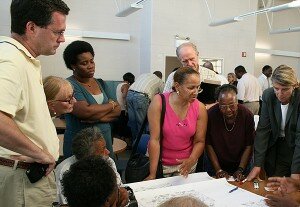 Whether you represent a nonprofit organization, volunteer center, corporation, community foundation, community of faith, or other group, these guidelines can help you thoughtfully approach and organize a successful partnership, thereby playing a key role in strengthening neighborhoods and families.
Whether you represent a nonprofit organization, volunteer center, corporation, community foundation, community of faith, or other group, these guidelines can help you thoughtfully approach and organize a successful partnership, thereby playing a key role in strengthening neighborhoods and families.
Building Trusting Relationships
Learn about the neighborhoods in your community. What are they issues they face? Which neighborhoods have projects with resident involvement emerging or already underway? Who are the community’s leaders? Are they interested in partnering with others?
Explore Your Organization’s Motives for Partnering With Communities
What goals or anticipated outcomes are you pursuing through partnership? What do you hope to gain? Why is it important that you establish a partnership? What is your long term commitment to low-income neighborhoods and to partnerships? What assets do you offer? How can you add value to the community’s work? Have you heard residents’ voices?
Learn About How Community Members Come Together to Address Issues and Concerns
 Meet with key community leaders or invite community representatives to forums where they can participate and become informed about resources for the neighborhood. Develop connections with leaders and residents that foster sustainable activities to address the issues they want to work on in their community.
Meet with key community leaders or invite community representatives to forums where they can participate and become informed about resources for the neighborhood. Develop connections with leaders and residents that foster sustainable activities to address the issues they want to work on in their community.
Identify Potential Partners
What other organization or individuals in the community should you involve in the partnership? Which partners are essential to the success of the project? Is the local Volunteer Center involved? Which businesses in the community have an interest in this neighborhood? Is the community Foundation involved? Are other organizations already working with the community? If so, which ones?
Establish a Partnership Plan with a Realistic Timetable and Realistic Expectations
Develop a shared understanding of the partnership and what you hope to achieve together. How will each partners contribute to the overall action plan and, ultimately, to its success? What is required to build trusting relationships with the community and its leaders and how will this impact your timetable?
Expect and Plan for Setbacks
Identify the likely challenges and barriers that may influence the partnerships’ success. How will you deal with changes in key project personnel or community leaders? What financial and other resources must be raised?
Learn From the Experience, Pause to Reflect, Evaluate, and Celebrate Your Shared Accomplishments
What will successful partnership project look like? What will be accomplished? How will the community change? How do you plant to measure your success?
What have your experiences been with community initiatives? Feel free to add your suggestions in the comments.
Related articles
- Seven Essential Principles of Neighboring
- More Tips for Overcoming Challenges in Neighboring Programs
- Tips for Building School and Nonprofit Partnerships

 When you’re looking to build a partnership with another organization, there are some things that you ought to think about before diving in head first.
When you’re looking to build a partnership with another organization, there are some things that you ought to think about before diving in head first.
